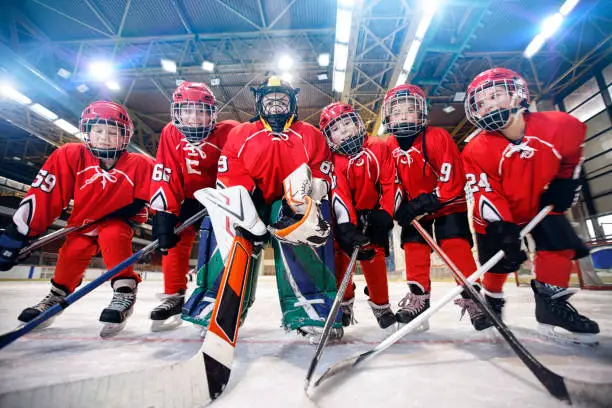Securing funding is a critical step for any sports program aiming to enhance its offerings, reach more participants, and achieve sustainability. In the world of hockey, where equipment and training costs can be substantial, obtaining financial support is not just beneficial; it’s often essential. Whether you’re a local community team, a school-based program, or a nonprofit organization focused on sports development, understanding how to navigate the maze of hockey grants is crucial.This comprehensive guide, titled “How to Apply for Hockey Grants” is designed to walk you through each step of the grant application process. From identifying the right types of grants to crafting compelling applications and meeting crucial deadlines, we cover all the bases to help your hockey program score the funding it needs to thrive.
Let’s lace up our skates and dive into the strategies that will help you unlock these funding opportunities, ensuring your program continues to grow and positively impact your community.
Understanding the Types of Hockey Grants Available
Identifying the right type of hockey grants is the first crucial step in securing funding for hockey programs. These grants are often the lifeline for community sports initiatives, offering financial support that can make a real difference in the development and sustainability of hockey activities at all levels.
There are several sources of hockey grants you can tap into. Local government bodies often provide sports development grants aimed at fostering physical activities in the community. These grants might focus on everything from improving facilities to providing essential equipment for youth teams. Additionally, sports federations are another valuable resource, offering youth sports grants that support the growth and professional development of young athletes.
Private foundations are also significant players in the grant arena. These organizations typically fund programs that align with their specific mission and goals, such as promoting sportsmanship, teamwork, or physical fitness among youth. Similarly, corporate sponsors, often linked with sports brands or local businesses, might offer grants or in-kind support as part of their corporate social responsibility programs.
When searching for grants, it’s essential to focus on finding opportunities that match the specific needs and goals of your hockey program. Each funding source has its unique set of requirements and focus areas. For instance, some might prioritize youth sports grants, while others may be more interested in projects that involve community engagement or building long-term sports infrastructure.
Understanding these nuances and aligning your program’s objectives with the grantors’ expectations is key. This targeted approach not only streamlines your search but also enhances your chances of making a successful grant application. Remember, the right grant can not only sustain but also elevate your hockey program, bringing invaluable benefits to participants and the community at large.
Check Your Eligibility for Hockey Grants
Before you dive into filling out applications, it’s critical to verify if your team or organization meets the eligibility for sports grants. This step is foundational; understanding and meeting these criteria can be the make-or-break factor in your quest for funding for hockey.
Eligibility criteria can vary significantly depending on the grantor. Generally, these requirements might include the geographic location of your program, the age groups it serves, and the specific nature of your activities—whether competitive, educational, or community-focused. For example, many youth sports grants are specifically targeted at programs serving underprivileged or underserved communities, aiming to provide opportunities that might not otherwise be available.
To determine your eligibility, carefully read through the grant guidelines provided by the funding body. Pay close attention to the fine print and look for any potential disqualifiers that could apply to your situation. If the guidelines aren’t clear, don’t hesitate to reach out to the grant providers directly. A quick conversation can clarify doubts and ensure you’re on the right track before investing time and resources into the application process.
In addition to the basic eligibility criteria, some grants may require your organization to have a certain status, such as nonprofit 501(c)(3) designation, or specific affiliations with sporting bodies. Ensuring that your hockey program aligns with these requirements beforehand can save you from disappointment later.
By meticulously checking your eligibility for sports grants, you not only ensure that your application is appropriate but also tailor your approach to increase your chances of success. Remember, every grant has its purpose, and finding a match between your program’s goals and the grantor’s objectives is key to securing the much-needed funding for hockey.
Gather Necessary Information for Your Hockey Grant Application
The grant application process requires thorough preparation, and gathering all the necessary information is a pivotal step. To strengthen your application and showcase your hockey program’s worthiness for funding, it’s crucial to have all your ducks in a row.
Start by compiling detailed financial records of your organization. This includes current and past budgets, financial statements, and funding sources. Sports funding opportunities often require a clear understanding of how funds will be managed, so presenting well-organized financial data is essential. Next, gather data about the demographics of your participants. Information such as age, socioeconomic background, and geographic distribution can help paint a picture of whom your program serves and the community impact.
Don’t forget about the qualitative aspects. Collect testimonials, success stories, and case studies that demonstrate the positive effects of your program on participants’ lives. These narratives can be very powerful in a grant proposal, giving a human face to the numbers and statistics. Also, if your program has previously received grants or sponsorships, document these partnerships and their outcomes to illustrate your experience with managing sports development grants effectively.
Additionally, it’s beneficial to have a clear, detailed plan for the potential grant money. Specify what the funds will be used for, whether it’s purchasing new equipment, hiring additional coaches, or extending the program to reach more youth. Be as precise as possible—grantors appreciate a well-thought-out plan that shows foresight and responsibility.
By ensuring you have all these elements at hand, you’re not just preparing for an application; you’re building a compelling case for your hockey program. This level of detail and organization can significantly enhance your credibility and appeal to grantors, improving your chances of securing funding for hockey.
Write a Compelling Grant Proposal for Hockey Grants
Writing a compelling grant proposal is arguably the most crucial part of the grant application process for securing funding for hockey. A well-crafted proposal not only communicates the necessities and potential impact of your program but also distinguishes it from others vying for the same sports development grants.
Start by clearly defining the need your hockey program addresses. Explain the community or demographic you serve and why this support is essential. Use data and anecdotes to strengthen your case. For instance, if your program helps youth develop teamwork and leadership skills, include statistics or stories that illustrate these outcomes. This helps to create a narrative that resonates with grantors, making it easier for them to understand the value of your program.
Next, outline your objectives in a clear, measurable way. Instead of vague ambitions, provide specific goals that can be quantitatively assessed. For example, rather than saying “increase participation,” specify “increase youth participation by 20% over the next year.” This clarity shows that your program has direction and you have a method to track its success.
Grant writing tips for sports often emphasize the importance of a detailed funding request. Specify exactly how the grant money will be used. Break down the budget, showing costs for equipment, training materials, and any other expenses. This transparency reassures grantors that their funds will be used appropriately and for the intended purposes.
Additionally, consider addressing how your program will continue after the grant funds are spent. Sustainability is a key concern for grantors; they want to invest in programs that have a long-term vision and potential for lasting impact.
Search for Funding Opportunities for Hockey Grants
Actively searching for sports funding opportunities is essential when looking to secure funding for hockey programs. Knowing where and how to find these opportunities can significantly enhance your chances of submitting a successful grant application.
Start by exploring specialized websites like Grants.gov, where numerous federal and state sports development grants are listed. These platforms are updated regularly with information on available grants, eligibility criteria, and application deadlines. It’s a practical approach to see what’s available and whether your hockey program fits the grantor’s objectives.
Local sports councils and associations often offer grants specifically aimed at developing sports programs within communities. These organizations understand the local sports landscape better than anyone and can provide tailored funding that supports grassroots initiatives, including youth sports grants.
Don’t overlook the potential of private foundations and corporate sponsors. Companies related to sports equipment, health and wellness, and community development frequently offer grants as part of their corporate social responsibility (CSR) initiatives. For example, the National Hockey League (NHL) Foundation provides grants to programs that encourage youth participation in hockey and foster inclusivity.
Networking is another invaluable tool. Attend sports management seminars, local community meetings, and other events where you can connect with potential funders and other sports program administrators. These interactions can provide insights into unadvertised grants or new funding streams. Sometimes, the key to unlocking grant opportunities is as simple as having a conversation with the right person at the right time.
Remember, the process of finding and applying for grants is ongoing. Keep a calendar of grant deadlines and set reminders to ensure you don’t miss out on any opportunities. Being proactive and persistent in your search will keep your hockey program in a strong position to receive the financial support for athletes it needs to thrive and grow.
Apply for Hockey Grants Before Deadlines
Once you’ve identified the right sports development grants, the next critical step in the grant application process is to ensure you apply well before the deadline. Adhering to deadlines is vital as late submissions are typically not accepted, and missing a deadline can mean waiting for another funding cycle to reapply—a delay that could impact your hockey program’s operations.
To manage this effectively, create a detailed timeline as soon as you decide to apply. Break down the application into manageable tasks such as gathering information, writing sections of the proposal, reviewing and revising, and final submission. Assign specific deadlines for each task, allowing plenty of buffer time for unforeseen delays or additional research needs.
Utilize tools like digital calendars or project management software to keep track of these deadlines. Setting up reminders can also help ensure that nothing slips through the cracks. If you’re working with a team, make sure everyone knows their responsibilities and the timeline they need to work within.
Being organized and proactive in managing your application timeline can make a significant difference. It not only keeps the stress levels down but also enhances the quality of your application, giving your hockey program the best chance of securing the needed funding for hockey.
Follow Up
After submitting your grant application, don’t hesitate to follow up. A courteous inquiry about the status of your application shows your commitment and enthusiasm. It also keeps you on the radar of the grant providers, which can be beneficial if you need to reapply in the future.
Prepare for Rejection or Success
Be prepared for any outcome. If you receive the grant, ensure you understand the stipulations for using the funds and reporting requirements. If your application is unsuccessful, seek feedback. Understanding why your application was not selected can provide invaluable insights for future applications.
Conclusion
Securing financial support for athletes and sports programs through grants can significantly impact your hockey program’s success and sustainability. By understanding the intricacies of applying for athletic grants, you can enhance your chances of obtaining crucial funding. Remember, persistence is key, and every application is a step forward in the competitive world of sports funding.
Explore Our Exclusive Selection of Grant Writing and Nonprofit Management Books on Selar
Purchasing these books on Selar is quick and simple. Once you buy, you can immediately download and print your copy, allowing you to access the information in the most convenient format for you. These resources are designed to be practical, insightful, and invaluable to your professional development.
- Advanced Grant Writing for Nonprofits : Focuses on sophisticated techniques for experienced grant writers. It delves into complex aspects of proposal development, offering strategies for dealing with competitive grant environments and large funding bodies.
- The Ultimate Guide to Federal Grant Applications: Techniques for Success: Navigating the complexities of federal grant applications can be daunting for many nonprofits. This essential guide demystifies the process, offering step-by-step techniques for success. It covers everything from understanding eligibility criteria to crafting persuasive proposals, managing submissions, and complying with reporting requirements. The book is designed to help nonprofit professionals maximize their chances of securing federal funding by providing practical tips, checklists, and examples of successful applications.
- Nonprofit Strategic Planning : Strategic planning is crucial for the growth and sustainability of any nonprofit organization. This book serves as an invaluable resource for leaders and managers looking to develop and implement effective strategic plans. It covers the fundamentals of strategic planning, including goal setting, environmental scanning, strategy formulation, implementation, and evaluation. Through practical advice, tools, and case studies, readers will learn how to align their organization’s mission with its strategic goals, ensuring long-term success and impact.
- Becoming the Grant Guru: Freelancer’s Guide to Success : Tailored for freelance grant writers, this book provides insights into building a successful career in grant writing. It includes strategies for finding clients, managing projects, and maximizing the impact of grant proposals.
- The Small Business’s Guide to Winning Grants : This resource is particularly useful for small businesses looking to secure grants. It offers practical advice on identifying suitable grant opportunities, understanding the requirements of small business grants, and crafting winning proposals.
Discover Essential Reads for Grant Writers and Nonprofit Leaders Available on Amazon
These resources are available now on Amazon in both Kindle and paperback formats, ensuring you can access them in whichever way suits you best.
- Advanced Grant Writing for Nonprofits : Focuses on sophisticated techniques for experienced grant writers. It delves into complex aspects of proposal development, offering strategies for dealing with competitive grant environments and large funding bodies.
- Crafting Nonprofit Annual Reports that Captivate: Strategies, Tools, and Examples for Success: This book offers a comprehensive guide for nonprofit organizations aiming to create impactful annual reports. It covers effective strategies, essential tools, and real-world examples to help organizations narrate their achievements and challenges compellingly. The guide emphasizes storytelling, visual communication, and stakeholder engagement, ensuring readers can produce reports that not only fulfill compliance requirements but also captivate and inspire donors, volunteers, and the community at large.
- The Ultimate Guide to Federal Grant Applications: Techniques for Success: Navigating the complexities of federal grant applications can be daunting for many nonprofits. This essential guide demystifies the process, offering step-by-step techniques for success. It covers everything from understanding eligibility criteria to crafting persuasive proposals, managing submissions, and complying with reporting requirements. The book is designed to help nonprofit professionals maximize their chances of securing federal funding by providing practical tips, checklists, and examples of successful applications.
- Nonprofit Strategic Planning : Strategic planning is crucial for the growth and sustainability of any nonprofit organization. This book serves as an invaluable resource for leaders and managers looking to develop and implement effective strategic plans. It covers the fundamentals of strategic planning, including goal setting, environmental scanning, strategy formulation, implementation, and evaluation. Through practical advice, tools, and case studies, readers will learn how to align their organization’s mission with its strategic goals, ensuring long-term success and impact.
- Mastering Grant Writing: A Nonprofit’s Guide to Effective Proposal Development and Submission: This book serves as a comprehensive guide, covering the entire process of grant writing. It includes tips on understanding funders’ perspectives, crafting compelling narratives, and the nuances of proposal submission.
- Becoming the Grant Guru: Freelancer’s Guide to Success : Tailored for freelance grant writers, this book provides insights into building a successful career in grant writing. It includes strategies for finding clients, managing projects, and maximizing the impact of grant proposals.
- The Small Business’s Guide to Winning Grants : This resource is particularly useful for small businesses looking to secure grants. It offers practical advice on identifying suitable grant opportunities, understanding the requirements of small business grants, and crafting winning proposals.
- Grant Readiness Guide: Preparing to Triumph in Funding Opportunities : A comprehensive resource for organizations at various stages of grant preparedness. It provides a roadmap for developing organizational capacity, aligning projects with funders’ goals, and creating compelling applications.
- Her Capital: Unlocking Women’s Small Business Grants: Specifically designed for women entrepreneurs, this book offers guidance on navigating the landscape of small business grants for women. It includes insights into grant sources, application strategies, and tips for leveraging grants to grow a business.
These books are not just resources; they are investments in your professional growth and the success of your organization.
Unlock Your Grant Success!
Join our email list now for exclusive grant-writing tips and unique grant opportunities delivered straight to your inbox. Click here to Subscribe. Don’t miss out!




